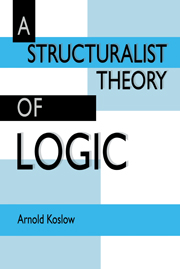Book contents
- Frontmatter
- Contents
- Preface
- Part I Background
- Part II Implication relations
- Part III The logical operators
- Part IV The modal operators
- 25 Introduction
- 26 Modality
- 27 Modals: Existence and nonextensionality
- 28 Special modals
- 29 The possibility of necessity-style modals
- 30 Modals revisited I
- 31 Quantification and modality
- 32 Modals revisited II
- 33 Knowledge, truth, and modality
- 34 The comparative strength of modals
- 35 Kripke-style systematization of the modals without possible worlds
- 36 Model functions, accessibility relations, and theories
- 37 Migrant modals
- Appendix A An implication relation for the integers in the programming language BASIC
- Appendix B Symmetric sequents as products of implication relations and their duals
- Appendix C Component-style logical operators and relevance
- Notes
- Bibliography
- Index
- Frontmatter
- Contents
- Preface
- Part I Background
- Part II Implication relations
- Part III The logical operators
- Part IV The modal operators
- 25 Introduction
- 26 Modality
- 27 Modals: Existence and nonextensionality
- 28 Special modals
- 29 The possibility of necessity-style modals
- 30 Modals revisited I
- 31 Quantification and modality
- 32 Modals revisited II
- 33 Knowledge, truth, and modality
- 34 The comparative strength of modals
- 35 Kripke-style systematization of the modals without possible worlds
- 36 Model functions, accessibility relations, and theories
- 37 Migrant modals
- Appendix A An implication relation for the integers in the programming language BASIC
- Appendix B Symmetric sequents as products of implication relations and their duals
- Appendix C Component-style logical operators and relevance
- Notes
- Bibliography
- Index
Summary
The Conditions for Modal Character
Let I = 〈S, ⇒〉 be an implication structure. We shall say that any function φ that maps S to S is a modal operator on I if and only if the following conditions are satisfied:
M1. For any A1, …, An and B in S, if A1, …, An ⇒ B, then φ(A1), …, φ(An) ⇒ φ(B).
M2. For some A1, …, An and B in S, A1, …, An ⇒ ̂ B, but φ(A1), …, φ(An) ⇏ ̂ φ(B).
Briefly expressed, the first condition for being a modal operator with respect to the implication relation “⇒” is that the operator distributes over the implication relation. The second condition states that the operator does not distribute over “⇒̂,” the dual of the implication relation. According to the first condition, the operator φ preserves all implications of the structure I. This in itself is a very natural “homomorphism-style” condition. But natural or not, the condition would be beside the point if most of the operators associated with familiar modal systems did not satisfy it. This, as we shall see later, they certainly do. In fact, for all so-called normal modal systems L, those for which a distribution axiom over conditionals holds [i.e., ⊢L□(A → B) → (□A → □B)] yield an associated operator that satisfies the first condition of modality. The difference is that a distribution axiom such as the one just described concerns the behavior of an operator with respect to conditionals, and neither of our conditions refers to any of the logical operators.
- Type
- Chapter
- Information
- A Structuralist Theory of Logic , pp. 246 - 253Publisher: Cambridge University PressPrint publication year: 1992



